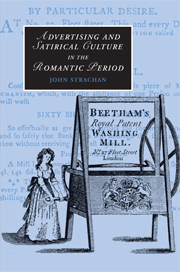Book contents
- Frontmatter
- Contents
- List of illustrations
- Acknowledgements
- Introduction
- 1 A ‘department of literature’: Advertising in the Romantic period
- 2 ‘Humbug and Co.’: Satirical engagements with advertising 1770–1840
- 3 ‘We keeps a poet’: Shoe blacking and the commercial aesthetic
- 4 ‘Publicity to a lottery is certainly necessary’: Thomas Bish and the culture of gambling
- 5 ‘Barber or perfumer’: Incomparable oils and crinicultural satire
- 6 ‘The poetry of hair-cutting’: J. R. D. Huggins, the emperor of barbers
- Conclusion: ‘Thoughts on puffs, patrons and other matters’: Commodifying the book
- Notes
- Bibliography
- Index
- CAMBRIDGE STUDIES IN ROMANTICISM
1 - A ‘department of literature’: Advertising in the Romantic period
Published online by Cambridge University Press: 22 September 2009
- Frontmatter
- Contents
- List of illustrations
- Acknowledgements
- Introduction
- 1 A ‘department of literature’: Advertising in the Romantic period
- 2 ‘Humbug and Co.’: Satirical engagements with advertising 1770–1840
- 3 ‘We keeps a poet’: Shoe blacking and the commercial aesthetic
- 4 ‘Publicity to a lottery is certainly necessary’: Thomas Bish and the culture of gambling
- 5 ‘Barber or perfumer’: Incomparable oils and crinicultural satire
- 6 ‘The poetry of hair-cutting’: J. R. D. Huggins, the emperor of barbers
- Conclusion: ‘Thoughts on puffs, patrons and other matters’: Commodifying the book
- Notes
- Bibliography
- Index
- CAMBRIDGE STUDIES IN ROMANTICISM
Summary
The advertisement has long since become an independent department of literature, subject to its own canons of criticism, having its own laws of composition, and conducted by a class of writers, who though they may (we do not assert they do) acknowledge their inferiority to the great historians, poets, or novelists of the day, would nevertheless consider themselves greatly injured were we to hesitate to admit them into the corporation of the ‘gens de lettres’ … The advertisement writer … claims kindred with genius of all sorts, and considers himself entitled to a share of the glory of all undertakings under the sun, from the Thames Tunnel to the manufacture of a razor-strop. In fact, he is to the … shopkeeper what Homer was to Achilles, Tasso to Godfrey, Camoens to Gama, or Milton to Cromwell: without him, what would his shops avail a Mechi, his XX a Guinness, his pills a Cockle, his Chesterfields a Doudney, his locks a Chubb, or his envelope a Stocken?
Thomas Hood, ‘The Advertisement Literature of the Age’ (1843)‘To let’ – ‘To let’, – ‘Lost’, – and ‘Wanted’. How very edifying these advertisements are! ‘Strayed!’ – ‘Rowland's Macassar’, – Ditto ‘Kalydor’, – and a ‘Fine bear to be shot!’ … Capital! capital! how I doat on advertisements.
John Oxenford, No Followers, A Burletta (1837)Despite recent revisionist work on the period (indeed, perhaps to a certain extent because of it), the sense that the literature of the age which we now label ‘Romantic’ is in some ways epoch-making remains difficult to shift.
- Type
- Chapter
- Information
- Advertising and Satirical Culture in the Romantic Period , pp. 12 - 71Publisher: Cambridge University PressPrint publication year: 2007



